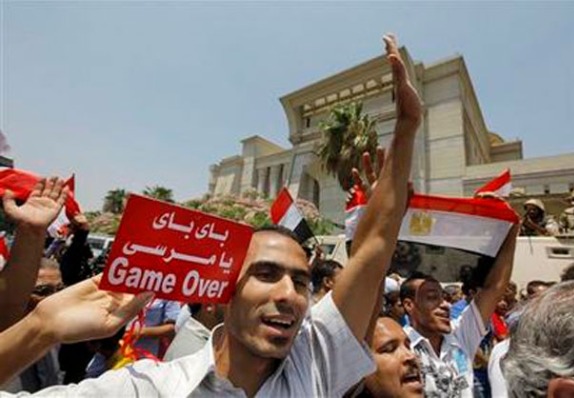
On Monday, the defense minister, general Abdel-Fattah al-Sisi, gave Morsi and his government a 48-hours ultimatum to resolve their internal problems and disagreements with other political sectors or follow a political “roadmap” the army would design and implement.
Mr. Sisi made clear the position of the army when he said “ I swear to God that we will sacrifice our blood for Egypt and its people against all terrorists, extremists and ignorant groups.”
This warning from the army was followed by a 45-minutes speech to the country by Muhammad Morsithe day after, where he blamed the remnants of the previous regime for being the main obstacle to democracy and for trying to challenge his leadership. During his speech, Mr. Morsivisibly nervousand with a defiant tone insisted many times on the validity of his government, repeating the word “legitimacy” more than forty times.
During his speech, Morsi offered no solution to the crisis and utterly ignored the millions of people who have taken to the streets of all cities of Egypt.
True, Morsi was the first democratically elected (Islamist) president in the history of Egypt. However, his narrow victory on the polls was a sign that people chose him simply because he was still preferable to Ahmed Shafik, a key member of Mubarak’s regime.
Since the beginning of his rule, Muhammad Morsi truly disappointed the people of Egypt, establishing an autocratic government, unable to solve the basic problems the country was facing and not meeting any of the demands expressed during the revolution of 2011.
Day after day, Morsi lost most of his supports, pushing for a non-representative constitution, accumulating power and disregarding the decisions and tasks of other authorities.
Morsi’s government showed incompetency facing the multiple crisis affecting Egypt, politically, socially and economically. Poverty rates, sectarian violence, sexual harassment, illiteracy, unemployment, thepetrol crisis andthe Nile water, among other factors, led to the polarization of the population.
Consequentlythefeeling of chaos was increasingly tangible in the streets, feeling like a bomb about to explode. Morsi was a bad president, and his government a bad dream.
The armed forces waited patiently for the complete decay of Morsi’s government to appear once again as the guardians of Egypt. People were cheering for them, celebrating in advance the ousting of the Islamist president. On Wednesday, at 9pm, General al-Sisitook to the stage and announced the deposition of Muhammad morsi as, according to al-Sisi “he did not achieve the goals of the people”.
The army’s “road map” relies on a limited transitional period lead by a government of civilian technocrats with no political affiliation followed by parliamentary and presidential elections.
The Constitution drafted under Morsi is cancelled and a group of experts will be in charge of writing a new one, aiming to reflect the interests of all sectors of society. The constitution has to be approved by Al-Azhar and then it will be put to a referendum.
The plan seems to show the willing of the army to create a stable Egyptian society where everyone is represented and there is no division.
Nevertheless, the first thing the army did after al-Sisi finished his speech was to shut down all television channels related to the Muslim Brotherhood as well as arresting a number of Muslim Brotherhood leaders in preparation for trials.
The fact that Morsi is gone does not mean the Muslim Brotherhood is, and we will have to wait to see if the accept this new situation peacefully. Also, let’s hope the transition starts taking place from today so that Egypt can stop looking into the past to start working for the future.


